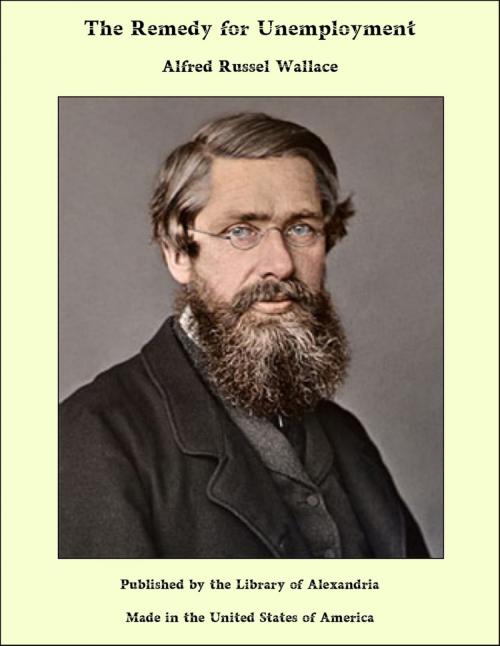The Remedy for Unemployment
Nonfiction, Religion & Spirituality, New Age, History, Fiction & Literature| Author: | Alfred Russel Wallace | ISBN: | 9781465610737 |
| Publisher: | Library of Alexandria | Publication: | March 8, 2015 |
| Imprint: | Language: | English |
| Author: | Alfred Russel Wallace |
| ISBN: | 9781465610737 |
| Publisher: | Library of Alexandria |
| Publication: | March 8, 2015 |
| Imprint: | |
| Language: | English |
The reason why I wrote the present pamphlet (which first appeared in the “Socialist Review,” and is now reprinted in a slightly modified form) was that, although there is a small body of avowed Socialists in Parliament, not one of them has, so far as I am aware, upheld any of the fundamental principles of Socialism as a means of dealing with the greatest of present-day problems—that of chronic unemployment and starvation all over our land. Let me illustrate what I mean by a few examples. Perhaps the most fundamental and universally admitted axiom of Socialism is that all production should be, primarily, for use and not for profit; and the next in importance is that the true or proper wages of labour is the whole product of that labour. But neither in Parliament nor out of it has a single voice been raised to show that these principles must be adopted in any permanent solution of the problem, or to explain how they can be applied far more easily and economically than any of the suggested alleviations. All the talk has hitherto been of securing trade union rates of wages for out-of-works of every kind; and the underlying idea has always been that of the non-Socialist worker—that the Government provision of work must not be looked upon as permanent, but only as enabling the worker to live till the capitalist employer again requires him. An equally non-Socialist view was put forth by one of the most respected Socialists in Parliament when he advocated the immediate construction of light railways all over the country in order that when labour was brought back to the land the products could be carried economically to market, implying that the “products” were to be sold, thus competing in the market with those of other producers, lowering prices, and altogether ignoring the great Socialist principle of “production for use.” In the discussion of this question it has been totally overlooked that by a proper organisation of the labour of the permanently or temporarily unemployed, as well as of all those whose employment does not supply them with the means of a thoroughly sufficient and healthy existence, all the necessaries and comforts of life can be produced in our own country, just as they were produced down to a few centuries ago. I will now proceed to the exposition of the whole subject.
The reason why I wrote the present pamphlet (which first appeared in the “Socialist Review,” and is now reprinted in a slightly modified form) was that, although there is a small body of avowed Socialists in Parliament, not one of them has, so far as I am aware, upheld any of the fundamental principles of Socialism as a means of dealing with the greatest of present-day problems—that of chronic unemployment and starvation all over our land. Let me illustrate what I mean by a few examples. Perhaps the most fundamental and universally admitted axiom of Socialism is that all production should be, primarily, for use and not for profit; and the next in importance is that the true or proper wages of labour is the whole product of that labour. But neither in Parliament nor out of it has a single voice been raised to show that these principles must be adopted in any permanent solution of the problem, or to explain how they can be applied far more easily and economically than any of the suggested alleviations. All the talk has hitherto been of securing trade union rates of wages for out-of-works of every kind; and the underlying idea has always been that of the non-Socialist worker—that the Government provision of work must not be looked upon as permanent, but only as enabling the worker to live till the capitalist employer again requires him. An equally non-Socialist view was put forth by one of the most respected Socialists in Parliament when he advocated the immediate construction of light railways all over the country in order that when labour was brought back to the land the products could be carried economically to market, implying that the “products” were to be sold, thus competing in the market with those of other producers, lowering prices, and altogether ignoring the great Socialist principle of “production for use.” In the discussion of this question it has been totally overlooked that by a proper organisation of the labour of the permanently or temporarily unemployed, as well as of all those whose employment does not supply them with the means of a thoroughly sufficient and healthy existence, all the necessaries and comforts of life can be produced in our own country, just as they were produced down to a few centuries ago. I will now proceed to the exposition of the whole subject.















